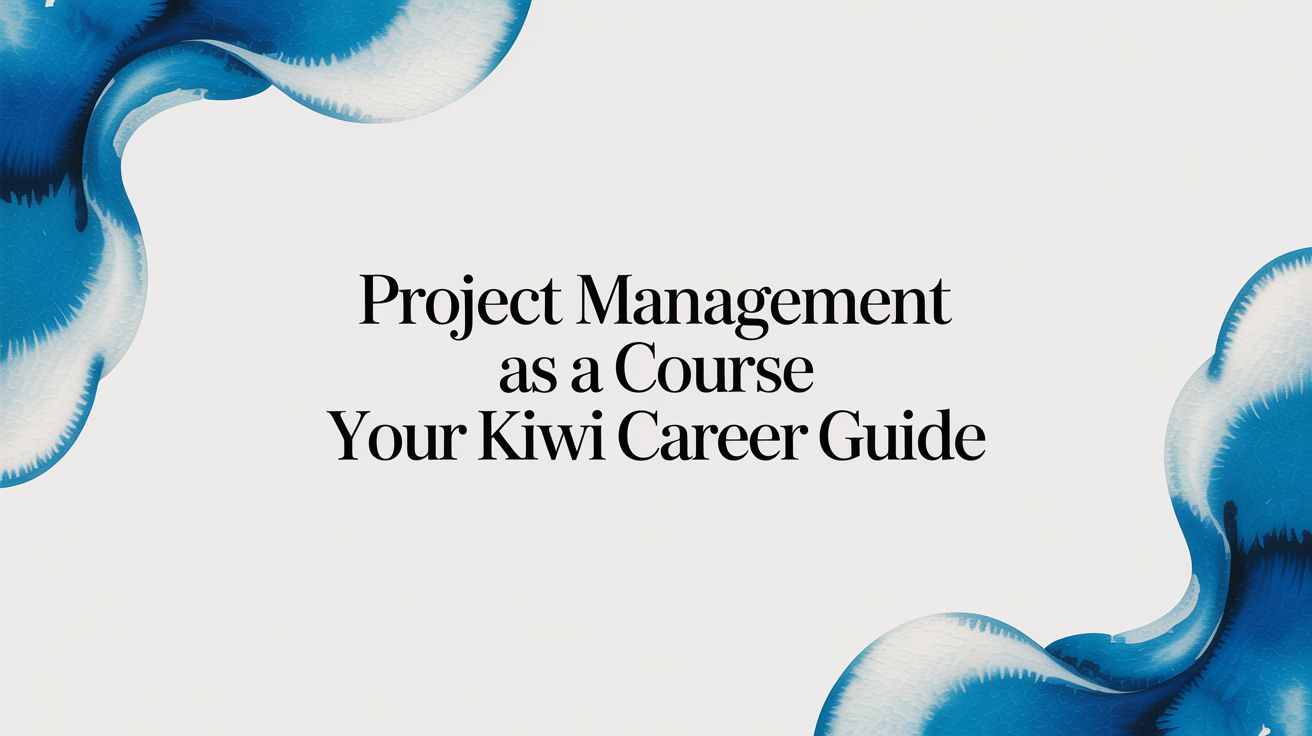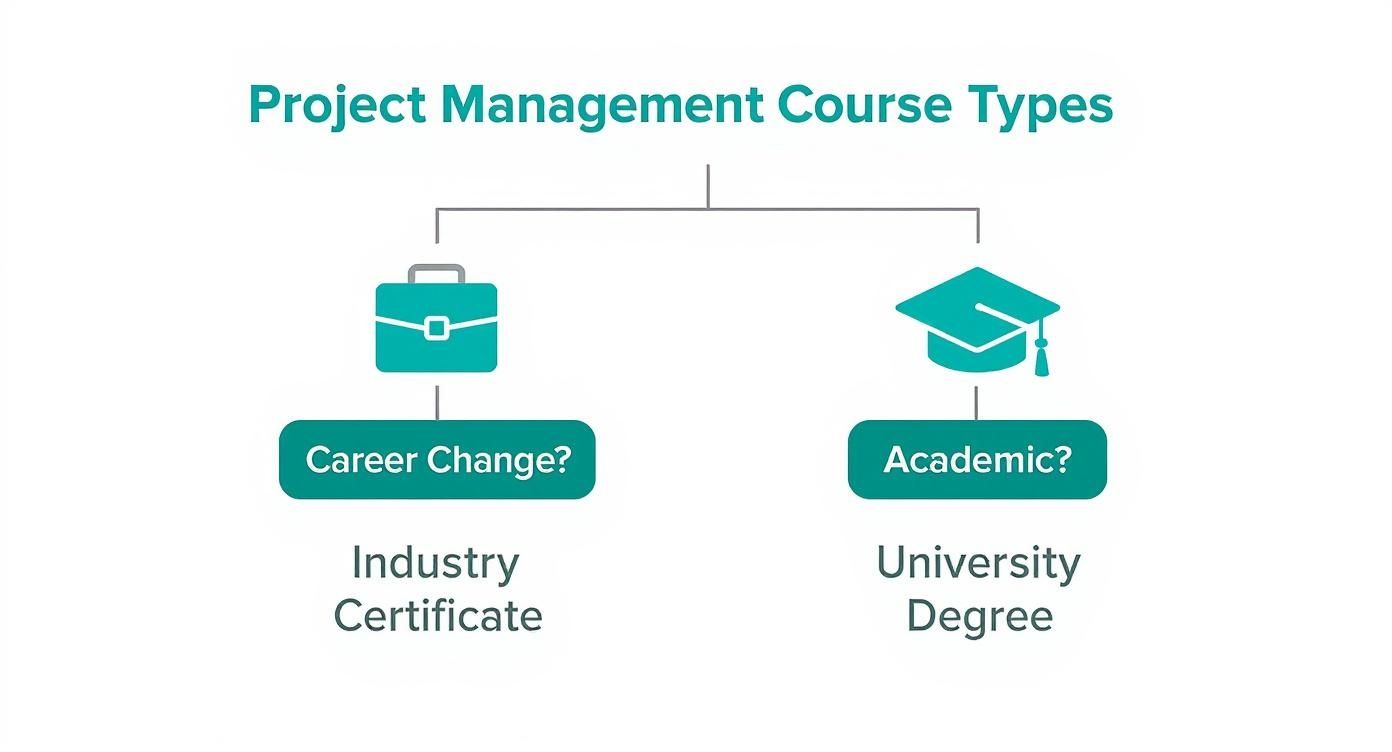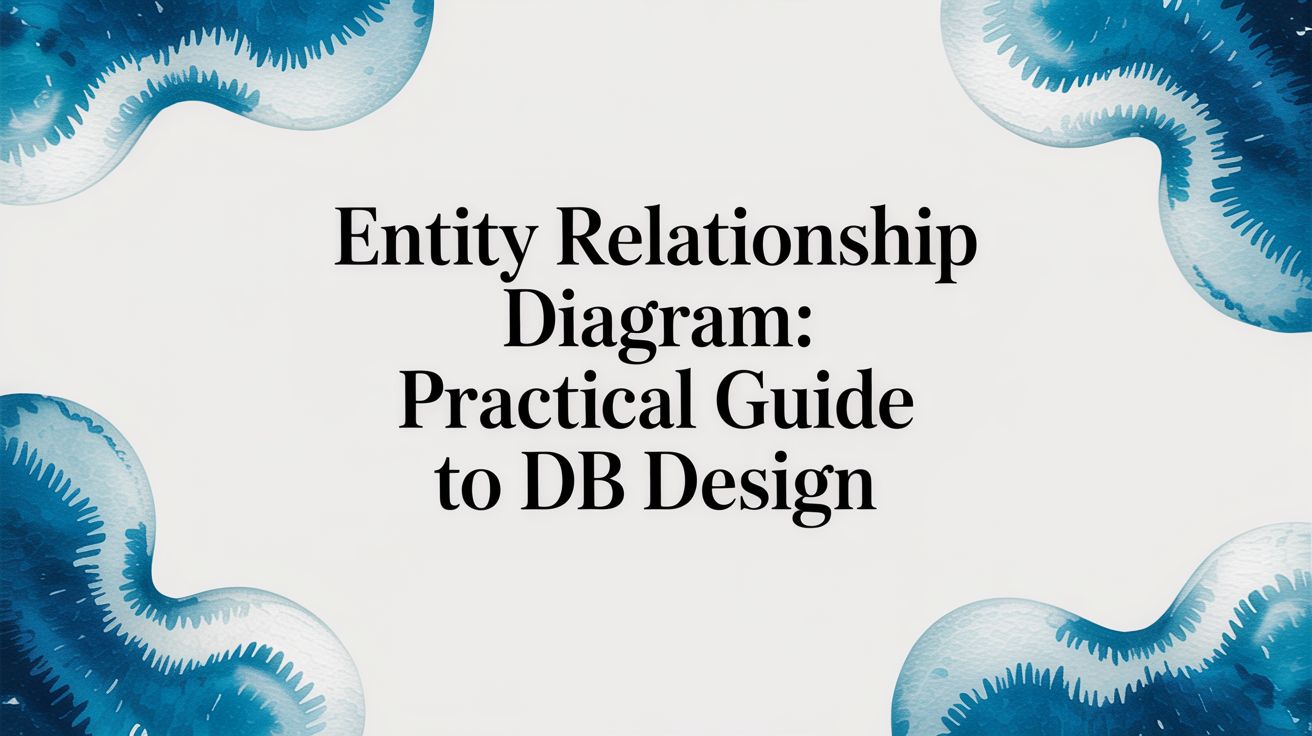
Project Management as a Course Your Kiwi Career Guide
Investing in a project management course is one of the smartest career moves you can make. It’s about taking all that on-the-job experience you have and shaping it into a formal, highly-valued skill set. This gives you a proven framework to deliver projects on time and on budget, making you a seriously valuable asset in New Zealand's competitive job market.
Why Project Management Skills Are in High Demand
Ever found yourself managing a tricky task at work, organising a community fundraiser, or even just planning a detailed family holiday? If you nodded yes, then you’ve already been acting as a project manager.
Taking a project management course is like a talented home cook finally going to chef school. The raw talent is absolutely there, but the formal training is what unlocks real efficiency, consistency, and a world of new opportunities.
It takes your natural instincts and turns them into a structured, repeatable process that Kiwi employers are actively looking for. In New Zealand’s fast-moving economy, businesses in every sector need people who can confidently guide a project from a simple idea to a successful launch. The demand isn’t just growing; it's becoming a non-negotiable for many roles.
The Growing Need Across Key NZ Sectors
The call for skilled project managers echoes across multiple industries. You’ll find it in Auckland's booming tech startups, Christchurch's ongoing construction projects, and our nation's ever-evolving healthcare system. The ability to manage complex work is now critical.
This wide-ranging demand means one thing: career stability and plenty of room to grow. The education sector that supports these skills is also expanding. In fact, New Zealand's School Education industry has grown by 3.9% per year over the last five years, now topping an estimated $12.9 billion. You can read more about this growth in IBISWorld's industry report.

Tangible Career Benefits
Completing a course gives you immediate, tangible advantages for your career. This is about more than just adding a new line to your CV; it's about gaining the real-world competence and confidence to step up and take on bigger responsibilities.
- Higher Earning Potential: Professionals who have formal project management training often command higher salaries. It's a simple equation.
- Clear Career Progression: It opens up a clear pathway to roles like Project Coordinator, Project Manager, and eventually, Programme Manager.
- Transferable Skills: The principles you learn can be applied across any industry you can think of, giving you incredible career flexibility.
By putting your time into a project management course, you’re not just learning a new skill—you’re setting the stage for a more rewarding and future-proof career.
What You Actually Learn in a Project Management Course

Jumping into a project management course can feel a bit like learning a new language. You’ll hear terms like 'scope creep' and 'risk mitigation' thrown around, and it's easy to feel a little lost at first.
But cut through the jargon, and you'll find a set of practical, real-world skills. The goal isn’t to memorise definitions; it’s to master a process that helps you turn a chaotic idea into a successful, tangible outcome.
Think about organising a local music festival in Wellington. It starts as just an idea, right? A good course gives you the tools to build a solid foundation under that idea. You'll learn how to define the project's boundaries, which is just a fancy way of saying Scope Management. For your festival, that means nailing down the number of bands, the venue size, and ticket prices. It's about drawing a clear box around the project so it doesn't spiral out of control.
This structured approach lets you build a project from the ground up, piece by piece, making sure nothing gets missed. A great course won't just tell you this; it will show you how to apply these concepts in a way that actually sticks. To get the most long-term value, it's worth understanding the top knowledge retention strategies for corporate training that effective courses use.
Breaking Down the Core Skills
A project management course gets you thinking about all the moving parts. It helps you ask the right questions before they become problems.
What happens if it pours with rain on festival day? What if ticket sales are way slower than you predicted? This is where Risk Assessment comes into play. You learn how to spot potential disasters before they happen and create solid backup plans, so you're ready for anything.
Then there’s Stakeholder Communication. Your stakeholders are everyone with a vested interest: the bands, the venue owner, the ticketing company, even the local council. A course teaches you how to keep everyone in the loop and on the same page—a skill that's absolutely critical for getting anything done smoothly.
These core skills are the true building blocks of successful project delivery. The table below breaks down what these competencies look like in the real world.
Core Skills Gained in a Project Management Course
A breakdown of the key competencies you will develop and how they apply in a professional setting.
Essentially, you move from just hoping for the best to actively planning for success.
The real value of a project management course isn't just learning theories; it's gaining the practical frameworks to anticipate challenges, communicate effectively, and confidently lead a project from start to finish.
Practical Frameworks for Real-World Problems
Beyond the individual skills, you also get to grips with the big-picture methodologies that guide projects. You'll get familiar with popular frameworks like Agile and Scrum, which are essentially different recipes for managing tasks and teams.
- Agile: This is an iterative, flexible approach. It's perfect for projects where things might change along the way, like developing a new mobile app for your festival. You work in short bursts, get feedback, and adjust as you go.
- Traditional (Waterfall): This is a more linear, step-by-step method. You have to finish one phase completely before you can start the next. It’s a better fit for projects with very clear, fixed requirements, like building the main stage for the festival.
Ultimately, a quality project management course takes all these concepts out of the textbook and shows you how to use them. You won't just learn what to do—you’ll finally understand the how and the why, giving you the confidence and the toolkit to handle any project that comes your way.
Your Career Path After Completing the Course

Finishing a project management course is like getting a detailed map to a whole new professional world. It’s not just about the certificate; it's about connecting your fresh skills to tangible career goals and seeing a clear path open up across New Zealand.
Your first step on this path is often a role like Project Coordinator. Think of yourself as the essential support system for a project manager—you'll be organising tasks, keeping track of progress, and making sure the whole team is communicating smoothly. It’s a fantastic, hands-on way to put your new knowledge into practice right away.
Once you've got some experience under your belt and have shown what you can do, the natural next step is moving into a Project Manager role. This is where you take the lead, guiding projects from the first idea to the final handover, all while managing budgets and keeping stakeholders happy.
Where The Opportunities Are In New Zealand
The demand for skilled project managers isn't the same everywhere; it’s really buzzing in New Zealand’s economic hubs. You’ll find your skills are most sought after in sectors that are constantly growing and evolving.
- Auckland's Tech Scene: The city is a hive of innovation, with a constant need for project managers to steer software development, new product launches, and digital projects.
- Christchurch's Construction Boom: With the ongoing rebuild and development, Christchurch has a steady demand for project managers who can handle the complexities of large-scale construction and infrastructure work.
- Wellington's Government and Public Sector: Big public initiatives, whether it's a new healthcare rollout or policy implementation, rely on sharp project management to make sure taxpayer money is used effectively.
With your course completed, you'll be primed to step into all sorts of roles, including the growing number of flexible remote project manager job opportunities.
Climbing The Career Ladder
The journey doesn't stop at becoming a Project Manager. After you’ve built a solid track record of successful projects, you can aim for a Senior Project Manager or Programme Manager role. Here, your focus shifts from managing single projects to overseeing a whole portfolio of related initiatives, making sure they all align with the company's big-picture strategy.
Think of your course as the launchpad. Each role builds on the last, turning that initial training into a rewarding, long-term career with more responsibility and a bigger paycheck.
And speaking of paychecks, the salary expectations climb pretty steeply at each level. A Project Coordinator can expect to start in the $65,000–$80,000 range. In contrast, an experienced Senior Project Manager in a high-demand industry can easily command a salary north of $150,000.
The skills you learn are directly tied to real-world success and financial growth. For more tips on getting ahead, check out our articles on career development. Your course is the first, most important step toward unlocking this lucrative and fulfilling future.
Finding Your Way Through Project Management Certifications and Training
Trying to figure out project management training can feel like looking at a map with all the place names written in a different language. You see a jumble of acronyms like PMP, mentions of university degrees, and a whole lot of different industry certificates. Let's cut through the noise and map out the different paths you can take.
The whole landscape really splits into two main streams: formal academic qualifications and practical, industry-focused training. Both have their place and are valuable, but they’re designed for different purposes and career goals. Getting your head around the distinction is the first step to choosing the right project management course for you.
A formal university degree, for instance, gives you a deep theoretical grounding and is recognised by the New Zealand Qualifications Authority (NZQA). This path has definitely grown in popularity. Project management as a university course in New Zealand has seen a steady climb in demand, especially at the postgraduate level. Big names like the University of Auckland offer various degrees in this space, perfect for anyone wanting a rigorous, academic foundation. You can learn more about NZ's university project management programmes on edvoy.com.
The Difference Between Academic and Industry Training
On the other side of the coin, you have practical training providers. These are organisations focused on getting you job-ready skills that you can literally start using at work the next day.
It's a really important point to grasp that these providers are not NZQA-registered colleges. Their mission isn't to hand out a multi-year academic degree. Instead, they deliver sharp, efficient training that closes the gap between theory and what actually happens on a real project. This distinction is key, as it lets you pick a learning path based on your immediate goals—are you chasing a formal degree, or do you need practical, employable skills right now?
The right choice isn’t about which path is “better,” but which path is better for you. Are you aiming for an academic credential to tick a box for a corporate job, or do you need agile, practical skills to make an immediate impact in your current role or the next one?
Plenty of learners get huge value from this hands-on approach. Training providers that focus on Continuing Professional Development (CPD) offer a flexible way to upskill and stay relevant. You can learn more about how practical training and partnerships help professionals keep their skills sharp.
Understanding Global Certifications Like PMP and PRINCE2
Once you’ve got some experience under your belt, you might start looking at globally recognised certifications to really cement your expertise. These aren't entry-level courses; think of them as professional credentials that signal your experience and skills on an international stage.
- PMP (Project Management Professional): This one is a big deal globally, coming from the Project Management Institute (PMI). It's designed for experienced project managers and confirms you have a comprehensive grasp of different project methodologies.
- PRINCE2 (PRojects IN Controlled Environments): This is a process-based methodology that gives you a very structured, step-by-step way to manage projects. It’s hugely popular in the UK and Europe, and you’ll see it used a lot by government bodies here in New Zealand.
Here’s a good way to think about it: a foundational course teaches you how to cook. A PMP or PRINCE2 certification is like earning a Michelin star. You absolutely need the fundamental skills first. A great project management course builds that solid base, setting you up to go for these advanced credentials later in your career when you’re ready for that next big leap.
How to Choose the Right Project Management Course for You
Picking the right project management course is a big step, but it doesn't need to be overwhelming. At the end of the day, the best choice is the one that actually fits your life and your career goals right now. It really boils down to one question: are you after a deep academic dive or practical, job-ready skills you can put to use on Monday morning?
For most busy Kiwis juggling work, family, and everything in between, flexibility is non-negotiable. This is where online courses really shine. They let you learn at your own pace, on your own schedule, without the rigid timetables and daily commutes of a traditional campus programme. It’s about putting you in the driver’s seat of your own education.
The next thing to weigh up is the time commitment. A formal university degree is a multi-year marathon, and that’s a massive undertaking. According to the OECD, only 33% of bachelor's degree students in New Zealand actually finish within the standard three years. That number climbs to 59% within four years, which still highlights the huge dedication required. You can learn more about NZ tertiary completion rates in the OECD report.
Matching Your Goals to the Right Format
Your career ambition is the best compass you have for choosing a path. Are you looking to make a career change and need skills that employers are hiring for today? Or is your aim a long-term academic qualification?
This simple decision tree can help you visualise the two main pathways for learning project management.

As the infographic shows, there’s a clear fork in the road: industry-focused certificates are brilliant for practical career moves, whereas degrees are built for more academic pursuits.
To help you decide what fits your lifestyle, here's a quick comparison of the two main learning formats available.
Course Format Comparison for Busy Professionals
Choosing the right format is less about which one is "better" and more about which one is better for you. It’s about aligning the learning experience with your personal and professional reality.
The Power of Practical and Stackable Learning
For many working professionals, the most direct path to success is one that delivers real-world skills without the multi-year lockdown of a degree. This is exactly where industry-focused providers come in, offering courses designed around the realities of the modern workplace.
The smartest choice is a course that respects your time and delivers skills you can apply on Monday morning, not just after three years of study. Practical learning is about immediate impact and building confidence quickly.
Another game-changing concept is stackable certificates. Instead of committing to one massive programme, you can earn smaller, specialised qualifications over time. This approach lets you build momentum, gain confidence, and add valuable, targeted skills to your CV at a pace that works for you.
These focused programmes give you the power to find the most efficient and effective path for your unique situation. If you’re exploring practical ways to upskill, our wider range of business courses offers similar flexible, industry-relevant learning paths. It’s an approach built around your life, helping you gain the project management skills you need without putting everything else on hold.
Your Questions About Project Management Courses Answered
Thinking about starting a project management course is a big move, and it's totally normal to have a few questions rattling around. Let’s clear up some of the most common queries we hear from aspiring project managers all over New Zealand. This is about getting you the final pieces of the puzzle so you can feel confident moving forward.
Getting these details sorted isn't just about finding any course; it's about finding the one that genuinely fits you, your life, and where you want to go with your career.
Do I Need Prior Experience to Start a Project Management Course?
This is easily one of the biggest worries we hear, but the good news is, for most foundational courses, the answer is no. Practical training providers design their entry-level courses specifically for beginners. They're also perfect for professionals who've been managing projects informally and want to put some official structure around what they already know. You don't need a "Project Manager" title on your CV to get started.
That said, it’s a different story for more advanced qualifications. A postgraduate university programme, for instance, will almost certainly require an undergraduate degree or a few years of solid work experience. The trick is to always check the entry requirements. It’ll tell you straight away if the course is a good match for your current skill level.
The best place to start is with an honest look at where you're at. If you’re building from scratch, a foundational certificate is the perfect launchpad. If you've been in the game for a while, something more advanced might be your next logical step.
What Is the Difference Between a University Degree and an Industry Certificate?
The main differences really boil down to focus, time, and accreditation. A university degree is a formal academic qualification, accredited by the NZQA. It takes several years and dives deep into the theory and principles behind project management.
An industry certificate, on the other hand, is vocational. It’s all about teaching you practical, job-ready skills that you can start using on Monday morning. While these certificates are not NZQA qualifications, their whole purpose is efficiency and real-world application. This makes them a fantastic option for career changers or anyone needing to get up to speed quickly. Your choice really depends on your goal: deep academic theory or fast, practical skills.
Should I Get PMP or PRINCE2 Certification?
PMP (Project Management Professional) and PRINCE2 are both heavy-hitters in the world of PM certifications, but they do different things. It’s useful to think of them not as starting points, but as credentials you earn once you're already an established professional.
- PMP is all about knowledge. It's a way of proving you have the experience and competency across a whole toolbox of PM techniques and methodologies.
- PRINCE2 is a specific, process-based methodology. It gives you a highly structured, step-by-step framework for running a project from beginning to end.
In New Zealand, many professionals build their core skills with a foundational course first. Once they have some real experience under their belt, they'll often go for a PMP or PRINCE2 to really accelerate their career.
Can I Get a Good PM Job with Only an Online Certificate?
Absolutely. In today's job market, what you can do often speaks louder than a piece of paper. Especially in fast-moving industries like tech and digital marketing, New Zealand employers put a massive value on demonstrated skills. An online certificate from a respected provider shows you’ve got initiative, you're committed, and you have a solid grasp of modern PM principles.
Sure, some traditional corporate or government roles might still lean towards a university degree. But a growing number of businesses are prioritising practical, current knowledge. When you pair a certificate with a portfolio that showcases projects you've managed (even small ones count!), you become a seriously strong candidate for a huge range of roles.
At Prac Skills, we specialise in practical, career-focused education designed to fit into the lives of busy Kiwis. Our flexible, online project management courses give you the job-ready skills you need to succeed, without the long-term commitment of a traditional degree. Start building your future today by exploring our courses at https://www.pracskills.co.nz.
.webp)

